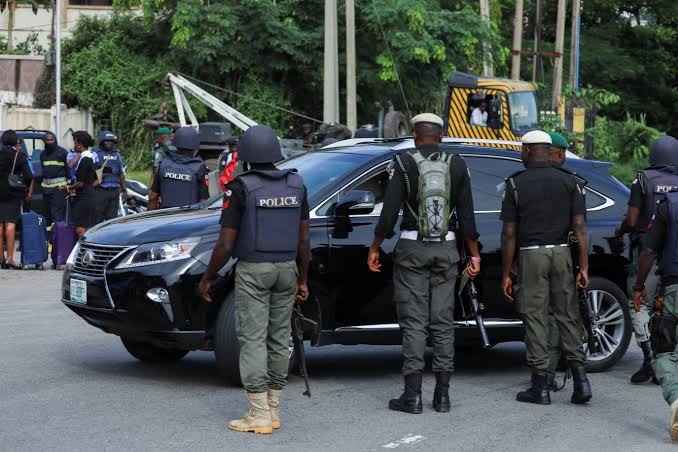Deepening Professionalism in Nigeria’s Police Force, by Grace Akpan
Concerns about the unprofessional conduct of police officers over the years have led to worrisome levels of distrust between the people and the Nigerian Police Force (NPF).
Established in 1943, the NPF has the constitutional and statutory mandate of maintaining and securing public safety, law and order in Nigeria. However, corruption, poor funding, and inadequate training impede the NPF’s capacity to discharge these roles efficiently and professionally. Over the years, declining investigative capacity and efficiency, and an uptick in policing abuses have eroded public trust in the police.
Professionalism is the cornerstone for effective policing, and it serves as the foundation for winning public trust, ensuring efficiency in law enforcement, and complementing the protection of human rights.
Public frustration over police abuses boiled over in October 2020 when Nigerian youths, under the #EndSARS, demanded the scrapping of the Special Anti-Robber Squad (SARS), a special unit of the Police that had become notorious for unlawful arrests and detention, torture and extralegal killings. They also demanded wholesale reform of the Nigerian Police Force. The #ENDSARS protest could be summed up in one brief statement: professionalize the police force.
SARS got dissolved. In its place, the Anti-Violence Unit was created. But more importantly, a collaboration between the NPF and the Rule of Law and Anti-Corruption (RoLAC) Programme emerged. This collaboration focuses on instating policy and practice changes, such as the Standards of Practice (SOPs) that lays down human rights-compliant policing procedures, as well as on training police officers to uphold human rights.
In addition to this, the NPF tried to strengthen their internal disciplinary processes by making sure that citizens’ complaints received via the police Complaints Response Unit were more interactive and receptive and conducting a proper investigation of all complaints, which has led to the dismissal and demotion of several erring officers. A typical instance of instilling discipline in the force is the dismissal of three policemen from Special Protection Unit (SPU) Base 1, Kano over the misuse of firearms in 2023. To further deepen these reforms and help improve the performance of the NPF the Nigeria Police Act of 2020 was enacted. The Act, which was passed and signed into law on 16th September 2020, seeks to provide and promote effectiveness, competence, transparency, and accountability in the police force.
The Act adequately provides for the structure of the force, appointments, promotions, and discipline, all of which are pivotal to fostering a professional and accountable police service.
While the Inspector General of Police, Kayode Egbetokun is working to rebuild trust through transparency, accountability, and community engagements, the General Public, Civil Societies, and the Media must actively play their watchdog roles for the NPF. They need to ensure objectivity in reporting police activities accurately and fairly, highlighting both successes and failures. The role of investigative journalism in exposing police misconduct cannot be overstated, as it often catalyzes reforms.
The private sector and donor agencies should strengthen their collaboration with the NPF. It is also pertinent that the Federal Government takes a second look at the remuneration of officers and men of the Nigeria Police. A pay rise with fringe benefits, as well as prioritizing the funding to the force, should be considered and given swift attention.
Also, depoliticizing the police by enforcing political neutrality and conducting regular and sustainable training will equip the officers with modern policing skills while underscoring the protection of human rights and ethical conduct and strengthening accountability mechanisms. Professionalism in policing is not just an ideal, but a necessity for ensuring the safety, security, and human rights of every Nigerian.
It is important to sustain these reforms. They are necessary to create the professional police force that Nigerians desire. The private sector and donor agencies should strengthen their support and partnership with the NPF. It is also pertinent that the Federal Government takes a second look at the remuneration of officers and personnel of the Nigeria Police. A pay rise, improved fringe benefits, and adequate funding to the police should be prioritized and given swift attention.
Urgent, sustained efforts to implement this reform will be key to transforming the Nigerian Police Force into a competent, trusted, and effective institution.
Akpan is the Communication Assistant International IDEA
Disclaimer: Opinions expressed in this commentary are those of the author and do not necessarily represent the institutional position of International IDEA, its Board of Advisers or its Council of Member States.
Follow the Neptune Prime channel on WhatsApp: https://whatsapp.com/channel/0029Va74ZvU2v1IqKByXoX3d
Do you have breaking news, interview request, opinion, suggestion, or want your event covered? Email us at neptuneprime2233@gmail.com


